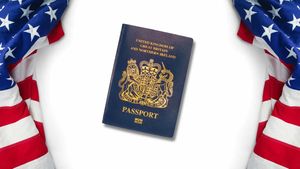Consumers across the United States are feeling the pinch as egg prices continue to soar, driven primarily by a severe outbreak of bird flu devastating poultry populations. Recent data shows the average price for a dozen eggs hit $5.29 as of February 2, 2025, reflecting a 50% increase over the past year, with notable price hikes since late 2024. Such surging prices resonate with larger trends of inflation affecting food costs nationwide.
The rise of egg prices has been staggering, with prices moving up from just over $3.50 last year to the current average. Experts indicate another significant jump may occur later this year, as demand is expected to spike leading up to the Easter holiday. According to agricultural analysts, consumers should prepare for a potential 20% increase before the end of 2025.
At the heart of this dramatic change is the highly pathogenic avian influenza (HPAI), particularly the H5N1 strain, which has led to the culling of over 13 million hens just last December. This massive slaughter has created a persistent shortage of eggs, leaving many grocery store shelves barren.
Shoppers are increasingly frustrated by rising prices and limited supply. Some stores have resorted to imposing purchase limits on eggs to manage dwindling supplies. "It’s just robbery... Eggs used to be a staple for us, but now you might as well dine out," lamented Minneapolis resident Sage Mills, highlighting the intense impact these changes have had on household budgets.
Experts warn this crisis may persist if there aren’t significant improvements within poultry health systems or the logistics of supply chains. The bird flu outbreaks, compounded by shortages of truck drivers, have complicated distribution, making it challenging to stabilize prices.
The U.S. Department of Agriculture (USDA), tasked with overseeing agricultural production and stability, recently projected continuing pressure on egg prices. According to USDA representatives, the combination of inflation, rising feed costs, and additional expenses related to poultry maintenance and health is creating what they refer to as a perfect storm for rising grocery bills.
Consumers have also noticed spikes as regional availability remains erratic. Especially notable are the prices for organic and cage-free eggs, which tend to be even higher. This heightened demand reflects the general consumer trend toward healthier options, yet they now come with jaw-dropping price tags. "The bird flu is affecting poultry farms and causing a national shortage, but this should not be an excuse for businesses to dramatically raise prices," stated Letitia James, Attorney General for New York.
The impact of bird flu extends beyond affecting prices—it raises questions concerning the economic health of poultry farmers themselves, who are now grappling with the need to rebuild their depleted flocks. Restocking can take months, creating even longer-term ramifications for both producers and consumers. The overarching concern is whether agricultural sectors can effectively combat and manage the bird flu, which has not just taken birds but also impacted the profitability and sustainability of farms.
With the impending approach of Easter—a period of traditional egg purchasing increases—consumer advocacy groups are closely monitoring the situation. Industry leaders are advocating for alternatives to stand-in substitutes for eggs or other protein sources to mitigate the financial burden on households struggling with financial strain. Those measures may not fully curb the price surges anymore than community recommendations on budgeting.
The political ramifications of rising egg prices also cannot be ignored. The current administration faces criticism over its handling of food prices, with Democrats targeting President Trump's campaign promises to lower costs following his presiding role as the agricultural command. Amid the escalation of egg prices, the current administration's efforts to pivot blame to historical mismanagement remain sensitive. Press Secretary Karoline Leavitt ascribed blame directly to the Biden administration during briefings, citing the administration's measures to control disease, including massive culling efforts, which she claims led to reduced supply and inflated prices for consumers.
While politicians trade barbs, the reality on the ground remains the same. Consumers face the highest costs seen for eggs, and the outlook remains bleak without effective policy changes, improved agricultural practices, and realistic supply chain enhancements to address the growing crisis.
Although egg prices have spiked significantly over the past year, many are left hoping for some stabilization within the market sometime soon. The USDA's focus will remain on monitoring bird flu's spread and advocating for recovery practices. Until then, shoppers are coping with eggs' soaring prices and empty grocery shelves, emphasizing the urge for proactive solutions to secure stable food supplies moving forward.



